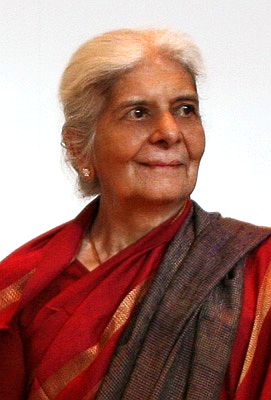Originally printed in the March - April 2002 issue of Quest magazine.
Citation: Burnier, Radha. "Strength or Weakness?." Quest 90.2 (MARCH - APRIL 2002):66.
By Radha Burnier
(extracted from "On the Watch-Tower" in the Theosophist, November 2001)
 Every earnest member of the Theosophical Society should know clearly that the Society does not offer a theology or dogma, a god, guru, or authority; it does not impose beliefs or encourage dependence. As Annie Besant stated, "We hold that Truth should be sought by study, by reflection, by purity of life, by devotion to high ideals." If the Theosophical Society were to offer a less daunting path to follow and were to set up a succession of gurus, preferably identifiable by means of vestments, pronouncements, and trappings, it might attract a much larger number of people to its fold. But what purpose would it serve?
Every earnest member of the Theosophical Society should know clearly that the Society does not offer a theology or dogma, a god, guru, or authority; it does not impose beliefs or encourage dependence. As Annie Besant stated, "We hold that Truth should be sought by study, by reflection, by purity of life, by devotion to high ideals." If the Theosophical Society were to offer a less daunting path to follow and were to set up a succession of gurus, preferably identifiable by means of vestments, pronouncements, and trappings, it might attract a much larger number of people to its fold. But what purpose would it serve?
There are persons who would like to see the Society's membership grow fast and its popularity increase.They want to please the public with psychologically comforting things that have little or nothing to do with the universal brotherhood which is the main Object of the Society, or with the common search and aspiration for truth that binds the far-flung Sections and members together spiritually in an affectionate bond of union. They regard it as a weakness in the Society that it does not cater to the wants of the public and change its aims to gain popularity.
The Society's clear policy is not to entertain the world with what it wants, but to aid people to discover the source of wisdom within themselves. This is not a weakness, but a strength. As the Mahatmas have stated, the Society's aim is not to instill belief and dependence, but "to teach man virtue for its own sake, and to walk in life relying on himself instead of leaning on a theological crutch, that for countless ages was the direct cause of nearly all human misery." This statement by the one known as KH is reinforced by his Adept friend M, who wrote to a member: "A constant sense of abject dependence upon a Deity [we might also say a guru] which he regards as the sole source of power, makes a man lose all self-reliance and the spurs to activity and initiative."
As the universe is governed by law in the grosser as well as the subtler planes of existence, and because cause and effect are inextricably connected, each person receives only what he or she merits. Following the Theosophical path means that by study, reflection, purity of life, and unselfish devotion to high ideals, enlightenment must be earned.
The Society's uncompromising policy is and must remain one of encouraging, not belief, but enquiry; not dependence on god or guru, but faith in the light of spiritual intelligence within one's own heart, and the determination to let that light shine by adopting the well-tested means to disperse the darkness of the selfish and ignorant mind.
Radha Burnier, who was born at Adyar, the Theosophical Society's international headquarters in India, is in her fourth term as international President of the Society. She has a Master of Arts degree in Sanskrit studies from Benares Hindu University and an honorary doctorate from Nagarjuna University. As a young woman she was an exponent of Indian classical dance, playing a major dramatic and dance role in the critically acclaimed Renoir film The River.

